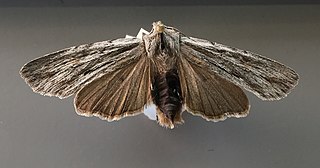Lithophane amanda, or Amanda's pinion, is a species of cutworm or dart moth in the family Noctuidae. It is found in North America.
Lithophane contenta is a species of cutworm or dart moth in the family Noctuidae. It is found in North America.

Lithophane baileyi, or Bailey's pinion, is a species of cutworm or dart moth in the family Noctuidae. It is found in North America.
Lithophane unimoda, the dowdy pinion, is a species of cutworm or dart moth in the family Noctuidae. It is found in North America.

Lithophane hemina, the hemina pinion, is a species of cutworm or dart moth in the family Noctuidae. It is found in North America.

Lithophane ponderosa is a species of cutworm or dart moth in the family Noctuidae. It is found in North America.

Lithophane patefacta, the dimorphic pinion, is a species of cutworm or dart moth in the family Noctuidae. It is found in North America.

Lithophane disposita, the dashed gray pinion, is a species of cutworm or dart moth in the family Noctuidae. It is found in North America.

Lithophane dilatocula is a species of cutworm or dart moth in the family Noctuidae. It is found in North America.

Lithophane pexata, the plush-naped pinion, is a species of cutworm or dart moth in the family Noctuidae. It is found in North America.

Lithophane pertorrida is a species of cutworm or dart moth in the family Noctuidae. It is found in North America.

Lithophane georgii, known generally as George's pinion moth, is a species of cutworm or dart moth in the family Noctuidae. Other common names include the large grey pinion and green fruitworm. It is found in North America.

Lithophane subtilis is a species of cutworm or dart moth in the family Noctuidae. It is found in North America.

Lithophane scottae, the fireweed groundsel, is a species of cutworm or dart moth in the family Noctuidae. It is found in North America.

Lithophane oriunda, the immigrant pinion, is a species of cutworm or dart moth in the family Noctuidae. It is found in North America.
Lithophane tepida, the luke-warm pinion moth, is a species of cutworm or dart moth in the family Noctuidae. It is found in North America.

Lithophane querquera, the shivering pinion, is a species of cutworm or dart moth in the family Noctuidae. It is found in North America.

Lithophane thujae, the cedar pinion, is a species of cutworm or dart moth in the family Noctuidae. It is found in North America.
Lithophane gausapata is a species of cutworm or dart moth in the family Noctuidae. It is found in North America.

Lithophane fagina, the hoary pinion, is a species of cutworm or dart moth in the family Noctuidae. It is found in North America.














